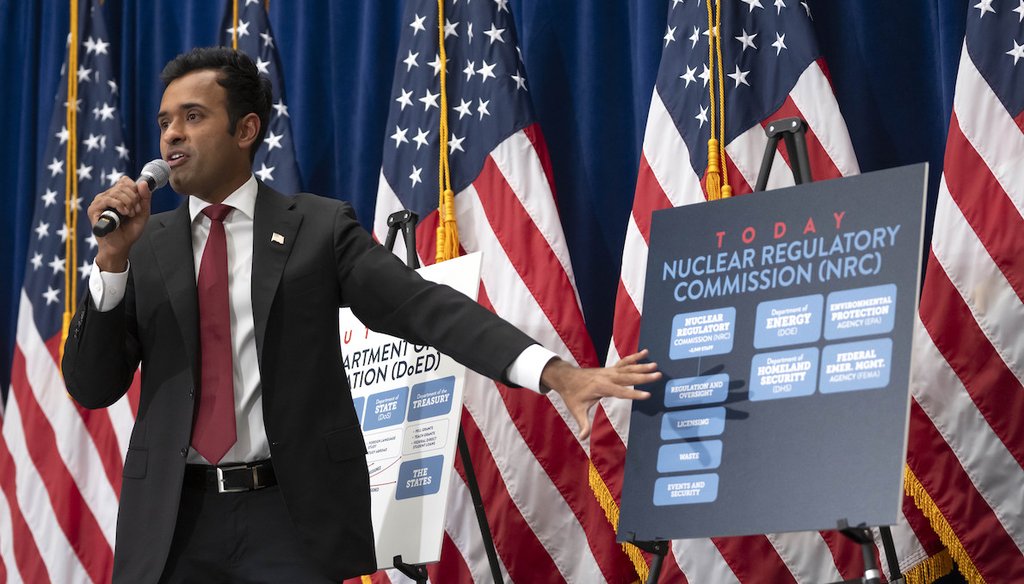Stand up for the facts!
Our only agenda is to publish the truth so you can be an informed participant in democracy.
We need your help.
I would like to contribute

Republican presidential candidate Vivek Ramaswamy speaks at the America First Policy Institute in Washington on Sept. 13, 2023. (AP)
Vivek Ramaswamy, an entrepreneur who is running for the 2024 Republican presidential nomination, is advocating laying off hundreds of thousands of federal workers — up to three-quarters of the entire federal workforce.
In a position paper released in mid-September, Ramaswamy called "the administrative state" an "unconstitutional, fourth branch of government." He asserted that he could singlehandedly gut the federal workforce if he wins the presidency.
"We will use executive authority to shut down the deep state," Ramaswamy said in a Sept. 13 speech at the America First Policy Institute in Washington, D.C., whose top officials include former Trump administration officials including Linda McMahon, who headed the Small Business Administration; Larry Kudlow, who was National Economic Council director; and Chad Wolf, who was acting secretary of homeland security.
Legal experts are dubious of his interpretation. They said sweeping cuts need to be approved by Congress, not accomplished by presidential action alone.
"The only way this could be changed would be for Congress to grant the president new reorganization authority," said Donald F. Kettl, the former dean of the University of Maryland’s public policy school. "That seems highly unlikely."
Mary E. Guy, a public affairs professor at the University of Colorado, Denver, agreed with Kettl.
"Ramaswamy’s claims are over the top," she said.
Ramaswamy, who is one of the highest-polling Republican presidential candidates not named Donald Trump, said he intends to cut the 2 million-plus federal workforce by half within his first year in office and by three-quarters by the end of his first term.
"Conventional wisdom holds that the U.S. president cannot exercise such authority without new laws from Congress," Ramaswamy wrote in his position paper. "That view is wrong."
Ramaswamy has also said he would shutter the FBI, the Education Department, the Bureau of Alcohol, Tobacco, Firearms and Explosives, the Food and Nutrition Service, and the Nuclear Regulatory Commission, although he said he would reassign some of their duties to other departments.
Ramaswamy argues that it’s a "myth" that the president has to agree with Congress to slash the government workforce. Existing laws, he said, have been "misinterpreted and fed incorrectly to people who have occupied the position that I'm running to occupy."
Ramaswamy argues that a president can circumvent civil service protections — laws that bar the firing of career civil servants for political reasons — by undertaking mass layoffs rather than firing career employees one by one. This plan would entail few requirements beyond 60-day notice and sequencing the cuts by seniority, he argues.
Because the power to order such layoffs falls to the agency heads, he argued in the position paper, the president "should appoint agency heads who are prepared to effectuate mass layoffs if that is the president's directives," effectively making that a litmus test for his appointees. If agency heads refuse to cooperate, the paper argues, the president can do it on his own.
Ramaswamy points to the Reorganization Act of 1977 (5 U.S.C. 901), which says the president "shall from time to time examine the organization of all agencies and shall determine what changes in such organization are necessary" to carry out government functions. He argues that this law continues in force, but related language that required the consent of Congress to make any changes have lapsed.
Creating and maintaining federal departments is a joint process involving Congress and the president, Kettl said.
"Congress isn't a private-sector-style board of directors," he said. "It shares policymaking authority with the president, and the president cannot act unilaterally. A president might want to eliminate agencies, but to do so the president would need Congress's approval. A president might want to eliminate large numbers of employees, but here again that would require an act of Congress."
Anne Marie Lofaso, a West Virginia University law professor, said she’s skeptical Ramaswamy’s argument would win in court.
"The 1977 Act contemplates reorganizations, not liquidations," she said. In addition, the 1977 law "does not contemplate reorganizing, let alone closing, agencies for political purposes under the guise of economic efficiency. It is intended to make the government more efficient, not to destroy the government."
Ramaswamy is arguing, Lofaso said, "that the president can unilaterally repeal a statute that authorizes the establishment of a government agency. That would be a radical revision of presidential power and a likely violation of separation of powers."
Congress could challenge Ramaswamy’s theory in court, she said, arguing that it has never given the president such authority and "certainly never contemplated that the president could do something that was really a legislative act."
Kettl noted that the Heritage Foundation, a conservative think tank, concluded in a 2017 analysis of how the government could be reorganized that the president "has no statutory authority to reorganize the executive branch, except where acts of Congress delegate authority to make particular changes." The analysis also found that the president "may create, reorganize, or abolish an office that he established, but he cannot fundamentally reorganize the executive branch in direct violation of an act of Congress."
"It's hard to find a more impeccable conservative source or a more definitive statement," Kettl said.
Conservative Supreme Court justices have been especially wary of presidential powers that are not clearly authorized by Congress, such as coronavirus vaccine mandates and student loan forgiveness.
There are practical arguments against eliminating three-quarters of the federal workforce.
Of the roughly 2.2 million civilian federal employees, almost 60% work for the departments of Defense, Veterans Affairs and Homeland Security, according to the Congressional Budget Office. But Ramaswamy’s plan doesn’t discuss cuts to Defense and Veterans Affairs, and discusses only duties that Homeland Security would pick up from other shuttered agencies.
"Cutting the people doesn't eliminate the mission," Kettl said. "If we eliminate three-quarters of all federal employees, how would we do what the public wants to get done? What will happen to lines at TSA checkpoints, landing of planes by (Federal Aviation Administration) control tower employees, and protection at the borders? Mission matters."
Guy, the University of Colorado, Denver professor, agreed.
"It is civil servants who know how to manage huge, complex, programs," she said. "Regardless of theoretical arguments, running the government requires experience. It is the president’s responsibility to keep the ship of state afloat, and Ramaswamy wants to empty out the boiler room and most everyone else. How long do you think the ship will stay afloat?"
Our Sources
Vivek Ramaswamy, position paper on government reorganization, accessed Sept. 22, 2023
Heritage Foundation, "The President’s Reorganization Authority," July 12, 2017
The New York Times, "Ramaswamy says he would fire most of the federal work force if elected," Sept. 13, 2023
Fox News, "Ramaswamy says Trump was 'duped by the adviser class' ahead of policy speech on gutting FBI, other agencies\," Sept. 12, 2023
SCOTUSblog, "Supreme Court strikes down Biden student-loan forgiveness program," June 30, 2023
E&E News, "Ramaswamy eyes 75% cut in federal workers," Sept. 13, 2023
Stanford Law School, "A look at the Supreme Court ruling on vaccination mandates," Jan. 20, 2022
FiveThirtyEight.com, Republican primary polling, accessed Sept. 23, 2023
Congressional Budget Office, federal personnel index page, accessed Sept. 26, 2023
Email interview with Ilya Somin, George Mason University law professor, Sept. 22, 2023
Email interview with Donald F. Kettl, former dean of the University of Maryland’s public policy school, Sept. 22, 2023
Email interview with Mary E. Guy, public affairs professor at the University of Colorado-Denver, Sept. 22, 2023
Email interview with Anne Marie Lofaso, West Virginia University law professor, Sept. 23, 2023






































